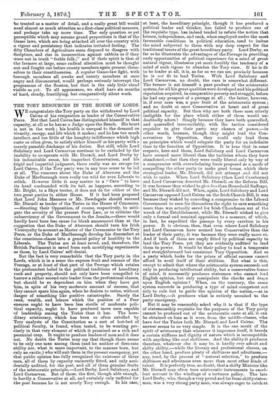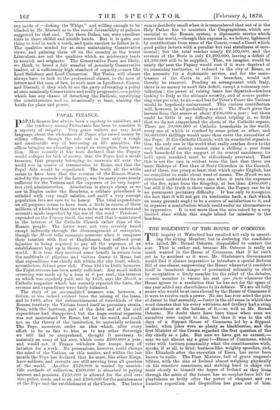'THE TORY RESOURCES IN THE HOUSE OF LORDS.
WE congratulate the Tory party on the withdrawal by Lord Cairns of his resignation as leader of the Conservative Peers. Not that Lord Cairns has distinguished himself in that capacity, at all as he has as a Judge upon the Bench. His heart is not in the work ; his health is unequal to the demand on vivacity, energy, and life which it makes; and he has too much intellect, and too little of the haughty indifference which high caste so often gives, to satisfy either himself or his party with a merely passable discharge of his duties. But still, while Lord Salisbury and Lord Carnarvon continue to be excluded by the inability to co-operate with Mr. Disraeli, and Lord Derby by his indomitable sense, his imperfect Conservatism, and his frigid and impartial judgment, there really was no escape for _Lord Cairns, if the Tory party was in any true sense to be led at all. The rumours about the Duke of Abercorn and the Duke of Marlborough were really too wild for even Liberals to relish. However little it may matter to a "Cave " to have its head confounded with its tail, as happens, according to _Mr. Bright, to a Skye terrier, it does not do for either of the two great parties in either House. If it had been proposed that Lord John Manners or Mr. Newdegate should succeed Mr. Disraeli as leader of the Tories in the House of Commons, —directing their Opposition, of course, respectively, to miti- gate the severity of the present Poor Law, or to criticize the subserviency of the Government to the Jesuits,—there would hardly have been less cause for blank amazement than at the suggestion that the Duke of Abercorn should turn his Irish Viceroyalty to account as Master of the Ceremonies to the Tory -Peers, or the Duke of Marlborough develop his discomfort at the conscience-clause into a general policy of hostility to the Liberals. The Tories are at least saved, and, therefore, the British Parliament is saved from such mortifying experiments as these, by Lord Cairns' self-denial.
But the fact is very remarkable that the Tory party in the Lords, which is in a sense the express fruit and essence of the Peerage, or at least of that part of the Peerage which retains -the profoundest belief in the political traditions of hereditary -rank and property, should not only have been compelled to borrow a rather second-rate leader from the professional classes, but should be so dependent on him when they have got 'him, in spite of his very moderate amount of success, that they cannot spare him again, when he desires to retire, without -danger of something like positive catastrophe. Surely the Tank, wealth, and leisure which the position of a Peer ensures ought to have been less sterile of moderate poli- tical capacity, ought to have produced more men capable -of leadership among the Tories than it has. The here- ditary aristocracy, which has been so often extolled by 'Tory analysts of the Constitution as a sort of hot-bed of -political faculty, is found, when tested, to be wanting pre- cisely in that very element of which it promised us a rich and perennial crop. It ought to produce leaders of men and it does -not. No doubt the Tories may say that though there seems -to be only one man among them (and he neither of first-rate ability nor, what is more important, to the manner born, but -only an exotic,) who will suit them in the present emergency, yet that public opinion has fully recognized the existence of three men, all of them by capacity eminently fitted, and only acci- .41entally unfitted, for the post, and all of them genuine fruits of the aristocratic principle,—Lord Derby, Lord Salisbury, and Lord Carnarvon. But of these, the first, though able enough, is hardly a Conservative at all, and certainly only unfitted for the post because he is not nearly Tory enough. In his case, at least, the hereditary principle, though it has produced a political leader and thinker, has failed to produce one of the requisite type,- has indeed tended to refute the notion that leisure, independence, and rank, when employed under the most favourable conditions in political education, tend to imbue the mind subjected to them with any deep respect for the traditional tenets of the great hereditary party. Lord Derby, so far as he illustrates the advantages of the Peerage in providing early opportunities of political experience for a mind of great natural vigour, illustrates yet more forcibly the tendency of a mind of such vigour to abandon the Tory view. If he is fit to be leader at all, it is, as far as we can see, precisely because he is not fit to lead Tories. With Lord Salisbury and Lord Carnarvon, no doubt, the case is somewhat different. The former is not himself a pare product of the aristocratic system, for all his great qualities were developed and his political reputation acquired, in comparative poverty and struggle, before he had any prospect of a peerage at all ; the latter, however, is, if ever man was, a pure fruit of the aristocratic system ; and no doubt at once Conservative at heart and of great political capacity. But then why are both these men utterly ineligible for the place which either of them would un- doubtedly adorn ? Simply because they have both quarrelled, and quarrelled irreconcilably, with the tactics considered requisite to give their party any chance of power,—in other words, because, though they might lead the Con- servatives in Opposition, they could only lead them on principles v,vhich would relegate the party for an indefinite time to the function of Opposition. It is true that in some respects, here and there, Lord Salisbury and Lord Carnarvon have seemed more liberal than the tactician whom they have abandoned,—but then they were really liberal only by way of a compromise with overwhelming force proposed as a mode of compelling the other party to make good terms, which their strategical leader, Mr. Disraeli, did not attempt and did not wish to make. When Lord Salisbury (then Lord Cranborne) and Lord Carnarvon deserted Mr. Disraeli on the Reform Bill, it was because they wished to give less than Household Suffrage, and Mr. Disraeli did not. When, again, Lord Salisbury and Lord Carnarvon opposed Lord Cairns on the Irish Church Bill, it was- because they wished by conceding a compromise to the Liberal Government to earn for themselves the right to save something more than was actually saved for Irish Churchmen out of the wreck of the Establishment, while Mr. Disraeli wished to give only a formal and nominal opposition to a measure, of which, in fact, he expedited the passage by every exertion in his power. It is obvious, then, that even where Lord Salisbury and Lord Carnarvon have seemed leas Conservative than the leader of their party, it was because they were really more so. And if both of them are amply fitted by political capacity to lead the Tory Peers, yet they are evidently unfitted to lead them to power. It would be their policy to lead a temperate and straightforward but consistent Tory Opposition. And so a party which looks for the prizes of official success cannot afford to avail itself of their abilities. But what is this, except to admit that where the aristocratic system succeeds not only in producing intellectual ability, but a conservative frame of mind, it necessarily produces statesmen who cannot lead English opinion, but only manipulate the checks and drags upon English opinion ? When, on the contrary, the same system succeeds in producing a type of mind competent not only to rule but to guide the opinion of the nation,—as in Lord Derby,—it produces what is entirely unsuited to the party emergency.
But it may be reasonably asked why it is that if the type of statesmanship requisite for the purposes of the Tory party cannot be produced out of the aristocratic caste at all, it can be obtained on loan as it were, from the middle-classes, who have lent the Tories both Mr. Disraeli and Lord Cairns. The answer seems to us very simple. It is the one merit of the spirit of aristocracy that wherever it impresses itself, it breeds a certain stiffness and dignity of nature which is incompatible with anything like real shiftiness. And the ability it produces therefore, whatever else it may be, is hardly ever adroit and shifty ability,—while the literary and professional classes, on the other hand, produce plenty of shiftiness and adroitness,— nay, tend, by the process of "natural selection," to produce shiftiness and adroitness even more than most other kinds of talent. It is perfectly true, no doubt, that a shifty Minister like Mr. Disraeli may often turn aristocratic instruments to excel- lent account in the windings of a tortuous policy. The late Lord Derby, who, though a very proud and far from shifty states- man, was a very strong party man, was always eager to catch at any mode of "dishing the Whigs," and willing enough to be blinded by Mr. Disraeli as to the moral defensibility of policies suggested for that end. The three Dukes, too, were excellent tools in those skilful and nimble hands. But it is quite one thing to lead in such a track, and quite another to follow in it. The qualities needed for at. once maintaining Conservative views, and palming them off on the country as the truest Liberalism, are not the qualities which an aristocracy tends to nourish and originate. The Conservative Peers are likely, we think, to breed a fair number of genuinely Conservative leaders, of a sufficiently high standard of capacity,—men like Lord Salisbury and Lord Carnarvon. But Tories will almost always have to look to the professional classes, to the men of letters and the men of law, to such men as Lyndhurst, Cairns, and Disraeli, if they wish to see the party advocating a policy at once nominally Conservative and really progressive,—a policy which has any chance of detaching the Radicals, mystifying the constituencies, and so, occasionally at least, winning the battle for place and power.



































 Previous page
Previous page